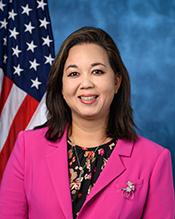US Representative
Jill Tokuda Authored & Sponsored Legislation
Co-Sponsor of Legislation
US
Us Congress 2025-2026 Regular Session
Us Congress House Bill HB3763
Introduced
6/5/25
Refer
6/5/25
Protect Vulnerable Immigrant Youth Act
US
Us Congress 2025-2026 Regular Session
Us Congress House Bill HB3772
Introduced
6/5/25
Refer
6/5/25
Defense Shipyard Workforce Housing Act of 2025
US
Us Congress 2025-2026 Regular Session
Us Congress House Bill HB3784
Introduced
6/5/25
Refer
6/5/25
Farmers Feeding America Act of 2025
US
Us Congress 2025-2026 Regular Session
Us Congress House Bill HB3868
Introduced
6/10/25
Refer
6/10/25
To amend chapter 44 of title 18, United States Code, to strengthen the background check procedures to be followed before a Federal firearms licensee may transfer a firearm to a person who is not such a licensee.
US
Us Congress 2025-2026 Regular Session
Us Congress House Bill HB3916
Introduced
6/11/25
Refer
6/11/25
To protect the privacy of personal reproductive or sexual health information, and for other purposes.
US
Us Congress 2025-2026 Regular Session
Us Congress House Bill HB3930
Introduced
6/11/25
Refer
6/11/25
Roadless Area Conservation Act of 2025
US
Us Congress 2025-2026 Regular Session
Us Congress House Bill HB40
Introduced
1/3/25
Refer
1/3/25
Commission to Study and Develop Reparation Proposals for African Americans Act
US
Us Congress 2025-2026 Regular Session
Us Congress House Bill HB433
Introduced
1/15/25
Refer
1/15/25
Department of Education Protection Act
US
Us Congress 2025-2026 Regular Session
Us Congress House Bill HB44
Introduced
1/3/25
Refer
1/3/25
Rural 340B Access Act of 2025
US
Us Congress 2025-2026 Regular Session
Us Congress House Bill HB484
Introduced
1/16/25
Refer
1/16/25
Refer
2/14/25
Refer
2/14/25
Food Deserts Act This bill establishes a grant program within the Department of Agriculture to reduce food deserts. Under the program, grants are provided to states for revolving funds that support the establishment and operation of grocery stores in underserved communities. Underserved communities are communities that have (1) limited access to affordable, healthy foods, including fresh fruits and vegetables, in grocery retail stores or farmer-to-consumer direct markets; and (2) a high rate of hunger, a high rate of food insecurity, or a high poverty rate.The bill requires states to use such funds for loans that support grocery stores in underserved communities, including for opening a store (excluding new construction), or supporting an existing store.In order to qualify for loans, grocery stores must meet criteria enumerated in the bill. For example, grocery stores must (1) emphasize unprocessed, healthful foods; (2) provide staple foods and a variety of raw fruits and vegetables; and (3) charge affordable prices at or below market values.Further, states must prioritize loan applications from entities that meet criteria related tohiring workers from the underserved community,providing classes or educational information about a healthful diet,sourcing food from local urban farms and gardens, anddemonstrating existing supply chain relationships in the grocery industry.
